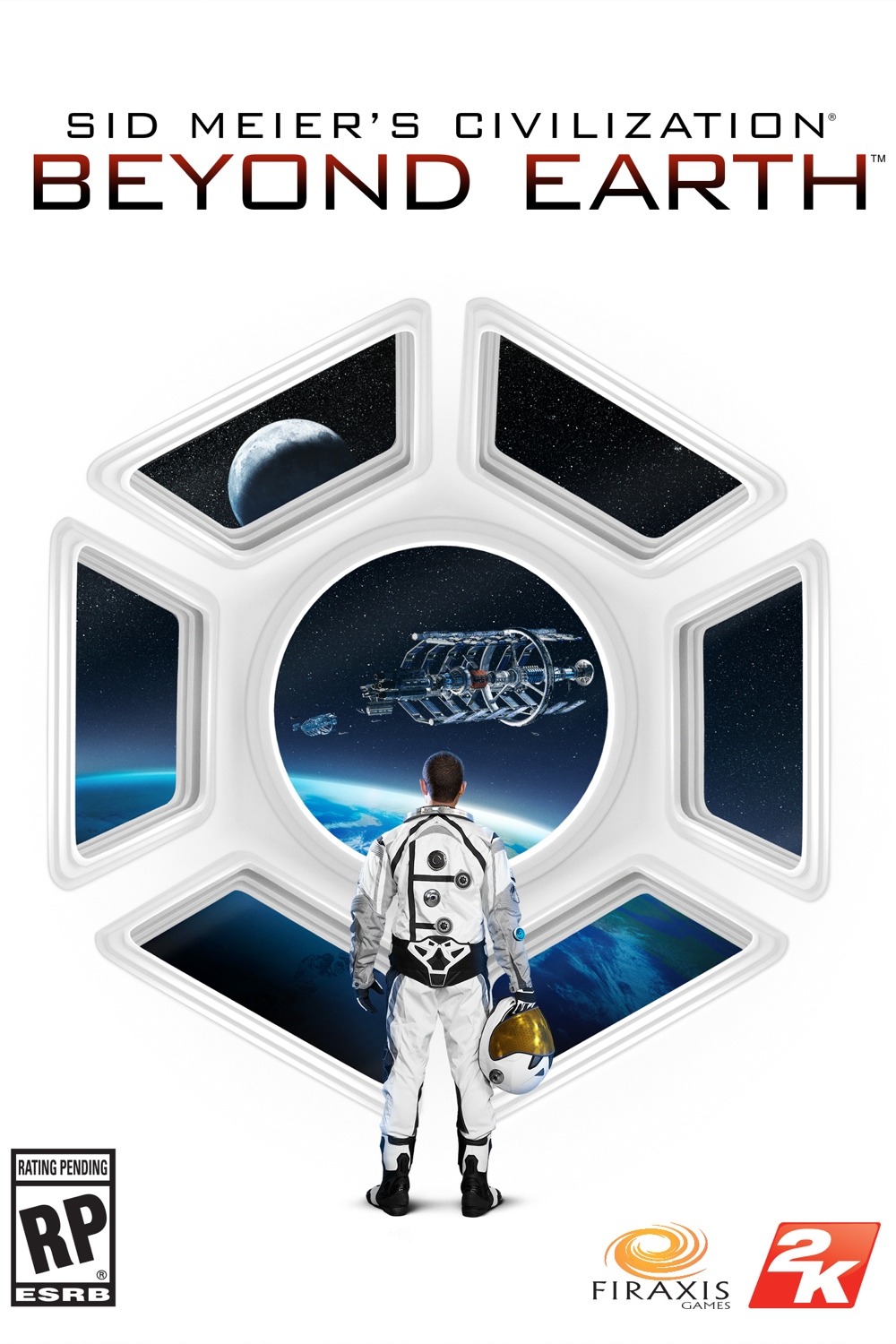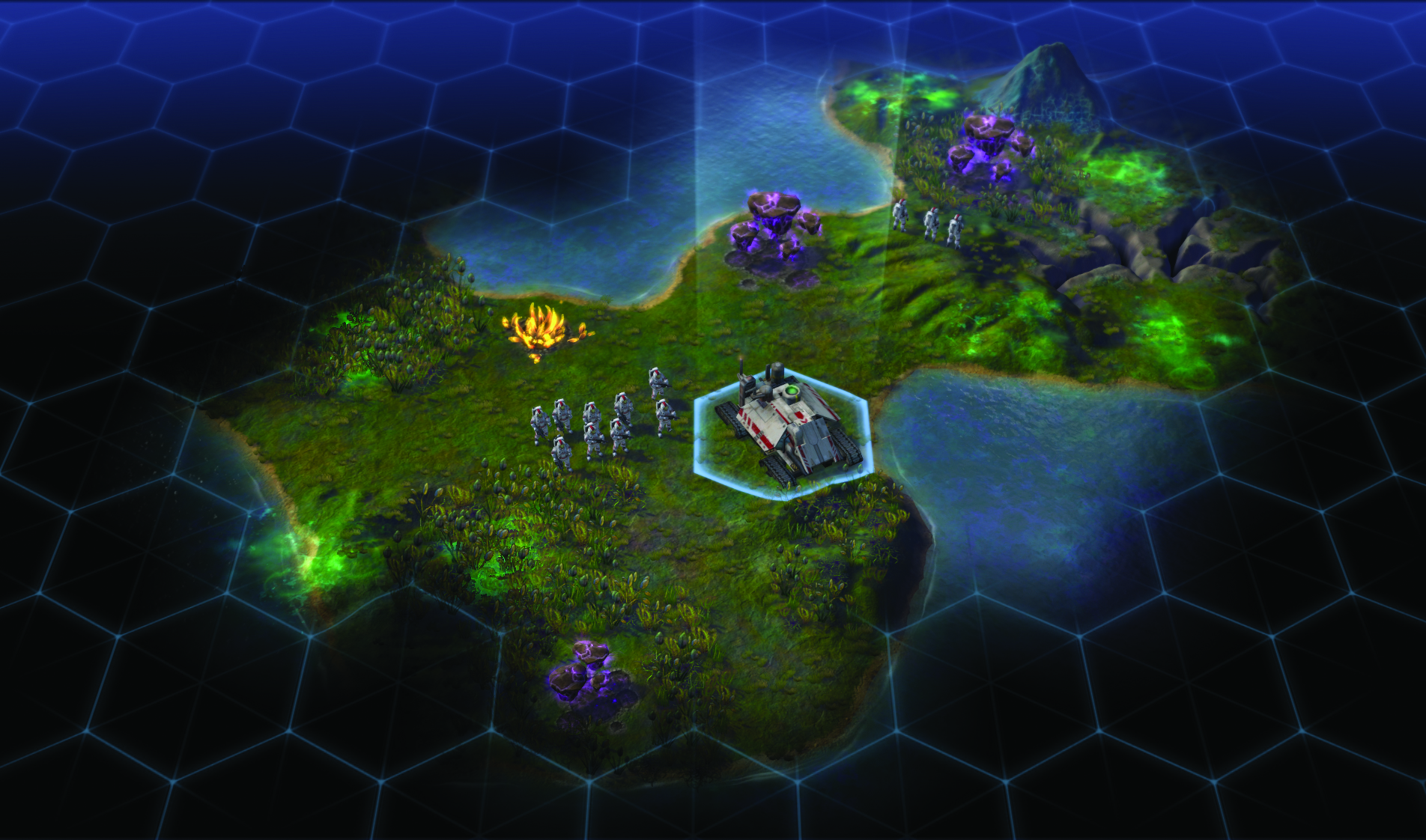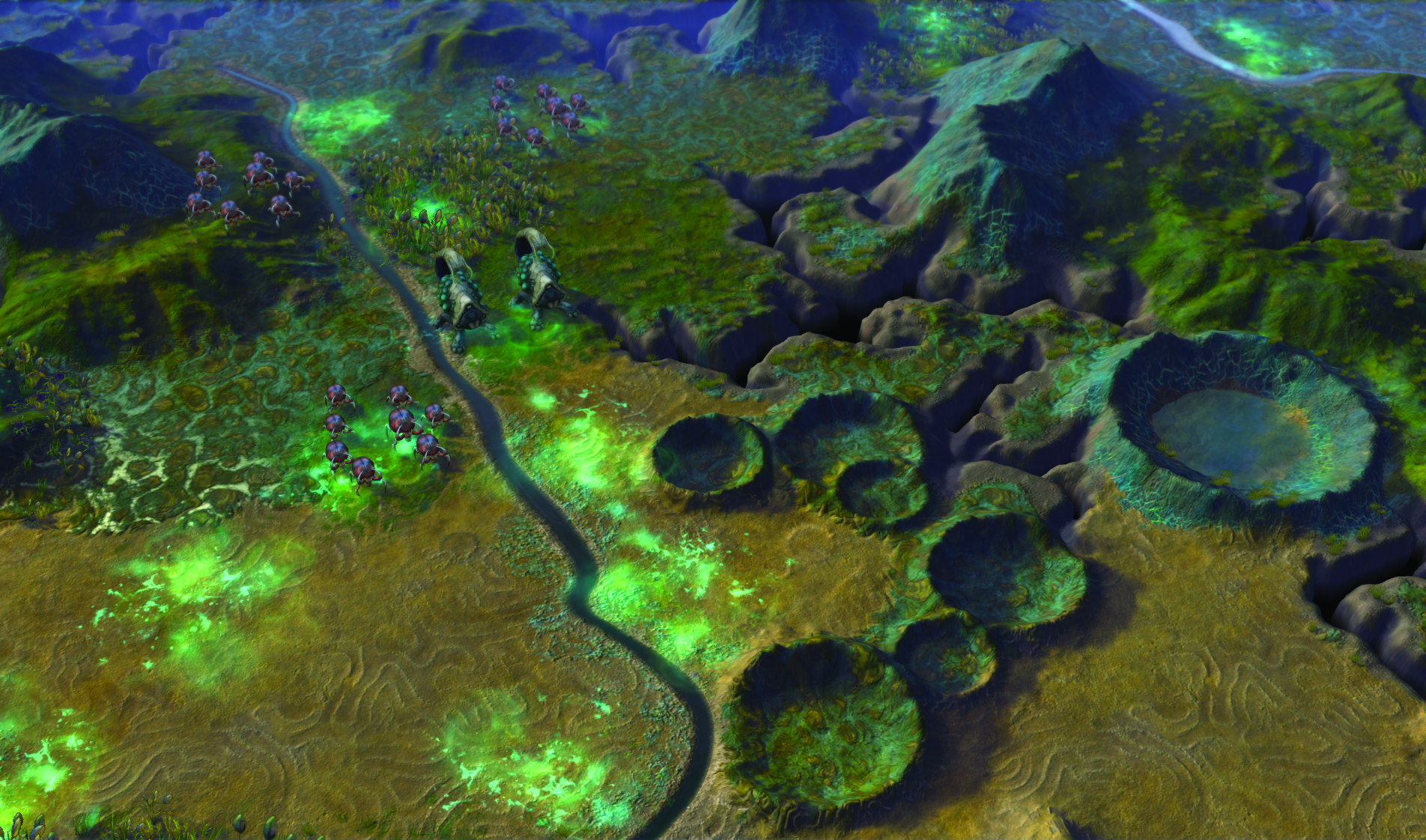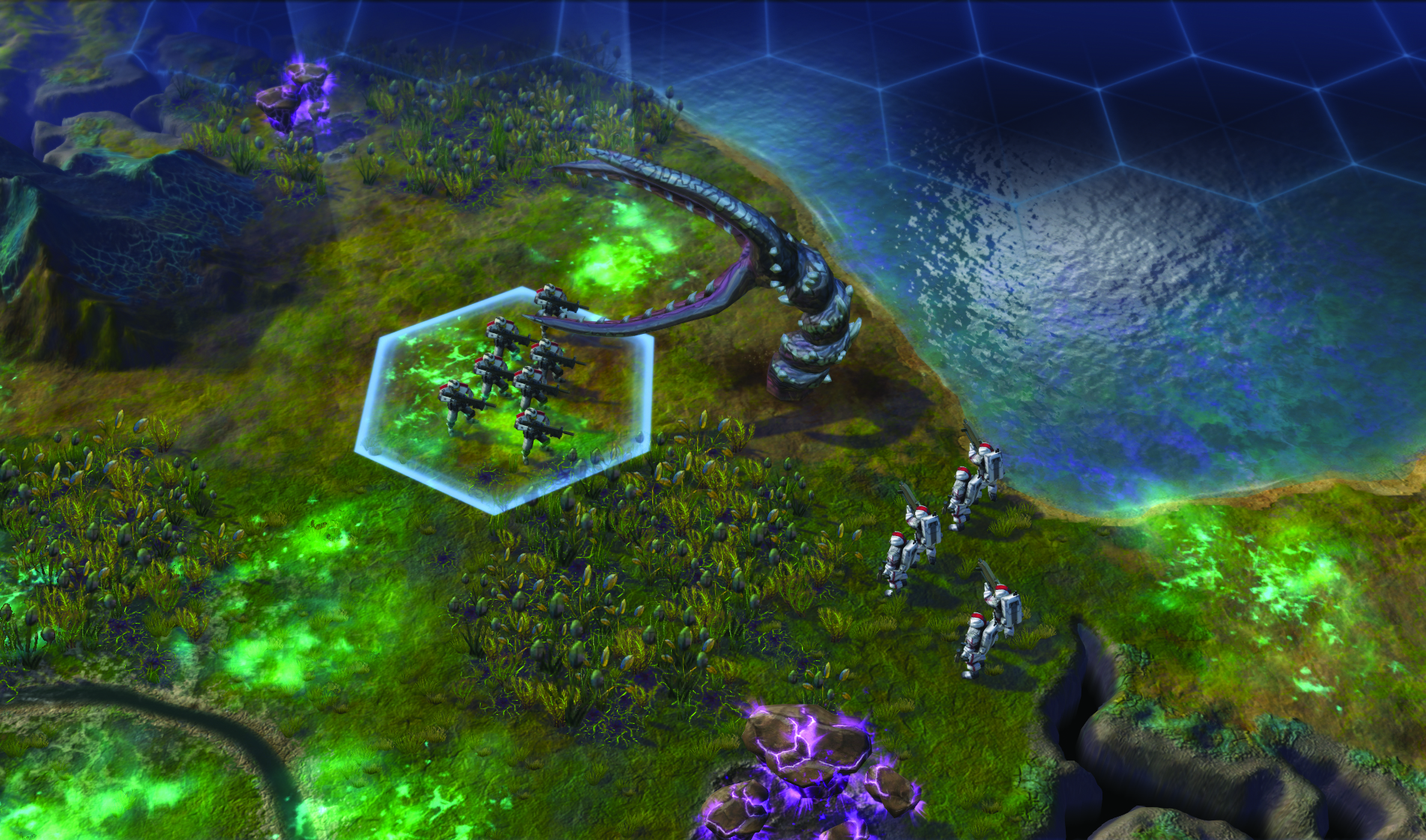
I’ll spare you prolix paragraphs of sentimental Sid Meier’s Alpha Centauri gushing and say just this: I loved it, you loved it, who didn’t love it? It’s probably the apotheosis of the Civilization franchise, design-wise, and that’s including everything since (with plenty of warm fuzzies for Civilization IV). Alpha Centauri‘s creative lead Brian Reynolds was a gameplay genius, as most who remember Civilization II and Rise of Nations would probably attest.
But Alpha Centauri didn’t sell well by Civilization standards, and so — perhaps because of that, perhaps for other reasons — it’s sat untouched for nearly a decade-and-a-half, without a sequel or even wishful public musing about one.
Sid Meier’s Civilization: Beyond Earth, which Firaxis is announcing at PAX East today, may finally bring an end to Firaxis’ hard-sci-fi, turn-based, planet-bound 4X (explore, expand, exploit, exterminate) drought. But it’s not Alpha Centauri 2 — just wipe any such notion from your brain. Alpha Centauri belongs to Electronic Arts, not Firaxis.
And so the design team at Firaxis had to come up with something fresh. Something with overt links back to the core Civilization franchise (thus the inclusion of “Civilization” in the title this time). Something that could, in theory and given roughly 15 years of design advances and lessons learned, be the superior sci-fi game.
Given Alpha Centauri‘s pedigree and harder-core player demographic, you might argue Firaxis’ challenge lies in turning a radically reimagined riff on Civilization V — a game praised by mainstream critics, but sharply criticized by core players — into something that can somehow appeal to both demographics. Or at least that’s my hope, having posed some of those questions (and concerns) to Beyond Earth gameplay designer Anton Strenger, Sid Meier’s Civilization series senior producer Dennis Shirk and associate producer Pete Murray.
Here’s what they told me.
Let’s get the elephant out of the room: Beyond Earth sounds a lot like an Alpha Centauri sequel on paper, but it’s not called that. How do the two relate?
Anton Strenger: Beyond Earth is a new entry in the Civilization franchise, and we’re definitely inspired by Alpha Centauri, but this is a different game and it’s meant to stand on its own. So what we’re really trying to do here is take a lot of the lessons we’ve learned from all the other Firaxis games and the knowledge that we have and apply it to a new setting, a setting free from historical context, where we can invent our own alien planet, and where there can be a lot of new interesting things that happen.
But I’m glad you mentioned Alpha Centauri, because it’s certainly something that’s on our minds here. It’s been an inspiration to me personally. It was the first 4Xgame I played, actually, back when I was in middle school. I learned over my friend’s shoulder and didn’t know what was going on, but it was really awesome and I wanted to learn more. So that ended up being my first Firaxis game. When I started at Firaxis three years ago it was very much on my mind.
We’re not making a sequel to Alpha Centauri, but we’re making a new entry in the Civilization series in that same kind of mold, in a science fiction setting with a lot of new opportunities that we get to invent ourselves.
Dennis Shirk: We wanted to ask ourselves what would happen after the spaceship [at the end of the Civilization games] launched, if we had a completely empty canvas, and what we could do with that if we weren’t confined by history.
Sure, but the lens through which core 4X gamers are going to view something like Beyond Earth is inexorably going to be Alpha Centauri, which had that same “What happens after the spaceship launches?” premise back in 1999.
DS: Sure, and I agree that no matter what, there’s going to be comparisons and assumptions made that this is going to be like another Alpha Centauri. But I think this is going to be a completely new take, and that’s going to be evident from the first time people are playing it. As Anton said before, there’s always going to be inspiration from a game like that. It’s in our DNA here at the studio just from having created it and Alien Crossfire [Alpha Centauri‘s official expansion].
But the experience itself, we want that to be a completely fresh take on what this would be like in space. We built it on top of the Civilization V engine, so we put a new renderer over the top and everything we needed to make it look spectacular and breathe new life into the series. But we wanted a regular Civilization V player — our core audience that we have for that game — to be able to pick this up and run with it.
That said, you’re not going to see an abundance of similarities between Beyond Earth and Civilization V. I mean, obviously you’re in space and colonizing a planet, but the gameplay systems we’ve introduced are all new, from the tech web to affinities to the way that the upgrade system works. We’ve diverged significantly from the original title.
AS: A great example is the tech web. In Civilization V or Alpha Centauri, even though the Alpha Centauri tech tree was a little more hidden from the player, you basically start at one point and you advance to another point, and it branches along the way, and in Alpha Centauri you could focus on exploring or discovering. In Civilization V you can focus on the naval track up top or the military track on bottom, but you’re kind of going in one direction the whole time.
Something that’s really different about Beyond Earth that makes it stand on its own — and not just compared to Alpha Centauri but as a 4X game in general — is the technology web. You’re starting in the middle of this vast spiderweb of cool technological threads taken from all the brainstorming we did by reading futurists writers and science fiction. So you’re going to see things like nanotechnology, things like genetics, things like xenobiology and all these different threads that take you in different directions on the web. You’re not advancing on this predefined track so much as exploring this technology space. The choices that you make in the tech web will lead you into one of three different affinities, and each affinity is like a post-human identity.

You have harmony, which strives for connection with the planet and its alien lifeforms. You have supremacy, which strives for connection with technology and cybernetics and kind of rejects the natural world. And you have purity, which is a rejection of both of those and instead looks back to old earth, the culture and the glory there, and tries to recreate it on the planet. All the different decisions that you make form your identity as you play the game, and I think that really sets it apart.
Is this as unique and singular an entry in Firaxis’ catalog as a game like Civilization V, or is it meant more as an extension of Civilization V, like a standalone expansion?
DS: What we wanted to do when we set out was make the core mechanics familiar enough so that existing fans could pick it up and recognize how to play the game. So it’s a 4X game, we still support one unit per tile hex, your cities are going to be building things, you’re going to be researching things, all of that foundational stuff. But the systems that we’ve built on top of that are robust and large compared to what we have in a typical Civilization V expansion. We wanted this to be completely set apart, a unique and distinct game that stands on its own.
The Colonization remake that used the Civilization IV engine still felt like it was built on Civilization IV‘s systems. Beyond Earth, by comparison, is an absolutely distinct experience. We can’t wait until we’re able to have people playing it because what the designers have done so far is amazing. I never expected it to go as far as it did — what the art team’s managed to accomplish, what the design team’s managed to accomplish to make this an completely unique experience.
AS: Yeah, everything from the aesthetics to the mechanics to the fictional story, it feels like its own game.
DS: But again, just to repeat, what I think is the great balance of the whole thing is that if you’ve just finished a game of Civilization V and you fire up Beyond Earth, those core tenets are going to embrace you like a warm blanket and you’re just going to be able to start playing.
Civilization V was broadly well-received, but there were a few who didn’t agree, who took issue with the A.I. and in so many words said it couldn’t play the game Firaxis designed — that it couldn’t cohere to basic, hex-based, wargame principles. Civilization V lead designer Jon Shafer was himself self-critical of the A.I. in a postmortem. What would you say to skeptics with regard to the A.I. in Beyond Earth?
DS: I read the same article that Jon Shafer put together on the A.I., and he was right about some of those things. There were shortcomings that started to come out, especially when you’re talking about a game with a million-plus fans. The great thing about our publisher is that they let us continue to improve the game well after release, through the expansions, through multiple balance patches and adding additional content. That’s one thing [Civilization V designer] Ed Beach really focused on in the core Civilization V engine: getting the A.I. up to where it could competently play the game and thrill players.
And I think in Brave New World [the final Civilization V expansion], when we finally closed out the series, the A.I. was in an amazing place. Ed took it a very great distance to where we all thought it was a really good experience. A lot of that strategic framework we brought forward into Beyond Earth, and then we handed it off to a brand new A.I. team.

AS: Beyond Earth‘s A.I. programmer, his name is Brian Whooley, has been with us from the very beginning. Will Miller and David McDonough, our lead designers, have worked with him on their previous project [Haunted Hollow for iOS] very closely. Me and Will and Dave share an office, and right across the hall is Brian Whooley, and we meet multiple times a week. He’s following in close step with all the design features that come on line, to make sure the A.I.’s up to par, that it’s winning the game in all the different ways and stuff like that. So the A.I.’s definitely been a focus for us, and we expect we’ll be in a good place at launch.
I think it was Soren Johnson who told me — this was years ago when he was working on Civilization III and I was putting together a feature about A.I. — that it’s easy to create an A.I. that can win, say by cheating, but it’s incredibly hard to create one that can win while cohering to the same strategic principles the player has to, much less employ those principles shrewdly.
Pete Murray: Sid actually gave an interesting talk at GDC a few years ago where he said players often experience the A.I. as cheating if it’s doing very well. So given that our ultimate goal is to create an exciting experience for players rather than an A.I. that can crush the player at every turn, we’re trying to create the best experience for as many people as possible.
AS: My attitude as a designer, and I think you’ll find that Will and Dave have similar attitudes, is that the A.I. — except on the higher difficulty levels — isn’t supposed to be a mathematically perfect, optimal opponent. It’s more like an actor on the stage of the game that the player’s playing. Having it be fun and visible in the right ways is really important to us, and something we think about all the time during development. I think when we’re implementing the A.I., we don’t often make the A.I. cheat. We try to make sure that it’s fair, but in the end it’s about serving the player experience, and that’s our number one goal.
It sounds like the startup process where you’re assembling a spacecraft and picking its cargo is going to distinguish itself from prior Civilization games’ world type and leader selection process.
AS: That’s correct, though when you say “spacecraft,” it’s nothing like you’d see in FTL. What we mean is there’s this phase of the game that happens before turn zero which we call the loadout process. The fictional framework that we’re using for Beyond Earth is that Earth in the near future decides to send expeditions into space to colonize alien worlds because there’s a kind of desperate situation on Earth and they’re looking elsewhere to continue the future of humanity.
In Civilization V or Alpha Centauri, you’d pick a faction or civilization and you’d get this prepackaged bag of benefits. So you’d get this bonus, you get this unit instead of that unit, you get this building instead of that one, and it’s all kind of together, which is cool, especially in a historical context, because you can say “Oh yeah, there’s that civilization I recognize from history, there’s that thing they do I read about in a history book.”
What Beyond Earth does instead is it takes Sid’s philosophy of a game as a series of interesting decisions and folds it into the gameplay itself. So you’re not just picking your faction and the bonus it comes with, you’re also picking the parameters of your expedition, leaving old Earth and going to the new planet. And so in addition to picking the nation that sponsors your expedition, you’re picking the type of spacecraft and the type of cargo it’s carrying.
So you could bring extra weapons to get off to an early military start, or you could bring extra construction equipment to help buff up your city with an extra building. You’re also deciding what types of colonists you want to bring with to form your first colony. They might be more intellectual, and you’d have scientific bonuses starting on turn one. Or they might be more cultural, focused on culture and refinement and development, in which case you’d be focusing on the culture part of the game out of the gate.
Each of these options you can choose differently every time. Whereas in Civilization V you might play as Montezuma every time, and other than the map being different, your core identity as the player would be the same, here you get to choose four things every time you start a game, and your A.I. opponents do as well.
Diplomacy’s arguably one of the weaker spots in the Civilization games, framed with fairly limited options and based more on obfuscation and mystery and a sense of algorithmic capriciousness. How does diplomacy work in Beyond Earth?
PM: We’re still building on where we were at the end of Civilization V, so I think the level of diplomacy that’s going on is going to feel very familiar to a Civilization V player. To some extent, playing a boardgame with a human opponent, they can be capricious too, so some of it’s about keeping that aspect of it. We do the best we can for the audience that we’re trying to reach.

AS: We’re definitely adding new diplomatic vectors, like the orbital layer, so your A.I. opponents aren’t going to be very happy if you launch a satellite over their lands. So diplomacy in Beyond Earth is going to be very responsive to all of the new gameplay systems. But at the same time, we’re trying to appeal to Civilization V players, since they’re our core audience, and we want diplomacy to be familiar and transparent. I think transparency’s a really big deal to make an A.I. feel fair.
Another thing, in the early game, is that one of the things we’re adding is the alien faction, so when you’re on the planet to start with, the other A.I. players are not as important as they are in a game of Civilization V. In Civilization V, you might explore beyond your borders with your scout unit, and on turn 15 you see “Oh, there’s Montezuma next to me. Okay, this gives me an impression of how the game’s going to play out.”
Whereas in our game, your first step is conquering the wilderness and really establishing a base of operations on this hostile alien planet. And the first part of that, before diplomacy really comes online, is interacting with the aliens and either attacking and purging them, or leaving them alone and hoping they don’t bother you.
DS: Before we wrap up, I just want to build on that a little bit. One of the great things about the experience in the early game of Beyond Earth is the fact that it’s you versus the environment. You’re alone on this planet, and the other players aren’t even there. Eventually, like by turn 20, the first one might land and they’ll introduce themselves and you’ll see a capital appear on the other side of the planet. But it’s you and you alone, and you have to decide how you’re going to help your colonists survive in those early days. It’s kind of crazy.
AS: Yeah, you’re disconnected at first, which is really interesting. It creates some really unique situations compared to a game of Civilization V.
MORE: The History of Video Game Consoles – Full
More Must-Reads from TIME
- Donald Trump Is TIME's 2024 Person of the Year
- Why We Chose Trump as Person of the Year
- Is Intermittent Fasting Good or Bad for You?
- The 100 Must-Read Books of 2024
- The 20 Best Christmas TV Episodes
- Column: If Optimism Feels Ridiculous Now, Try Hope
- The Future of Climate Action Is Trade Policy
- Merle Bombardieri Is Helping People Make the Baby Decision
Write to Matt Peckham at matt.peckham@time.com